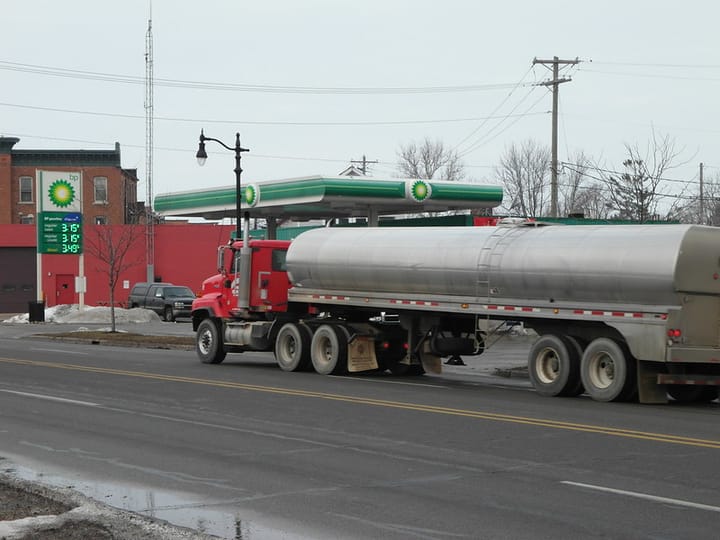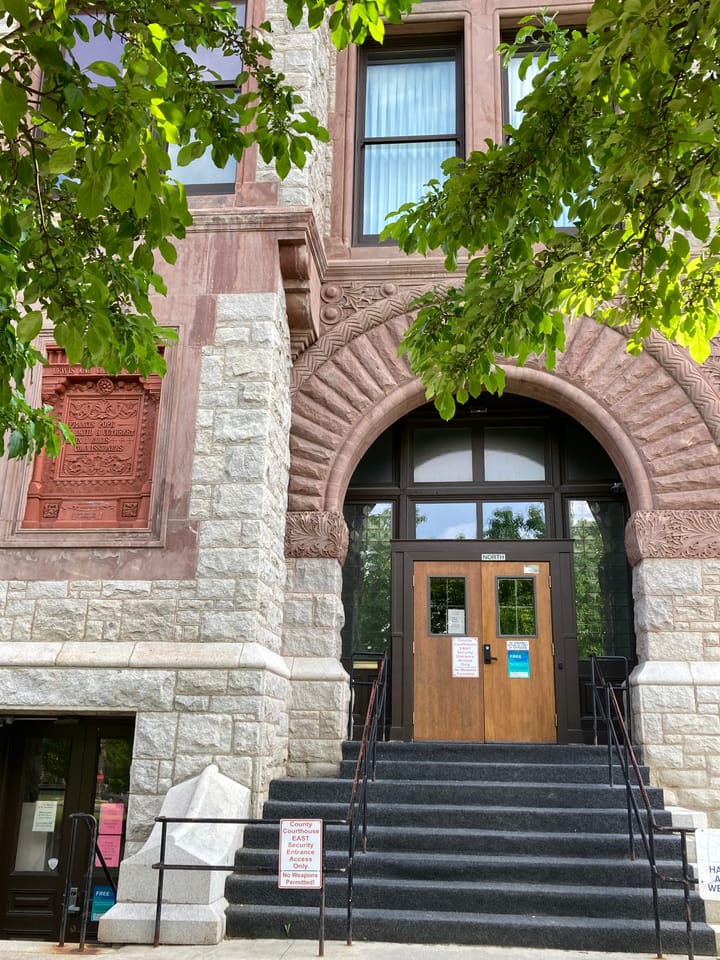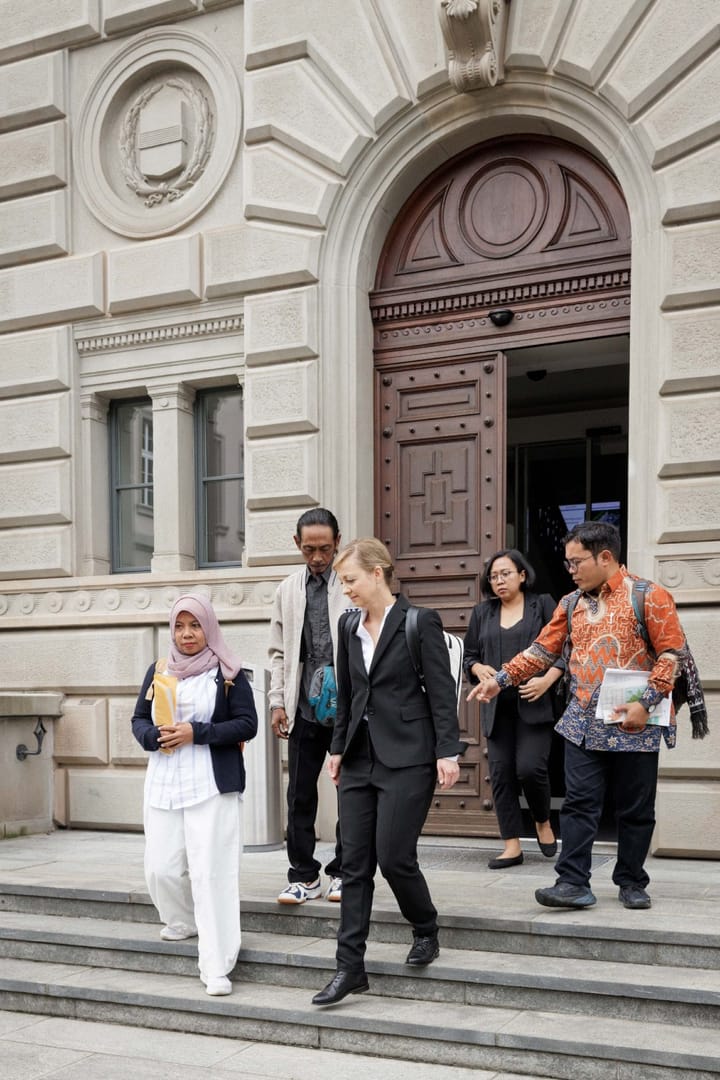Indonesian Islanders Take Their Fight For Climate Justice To Swiss Court
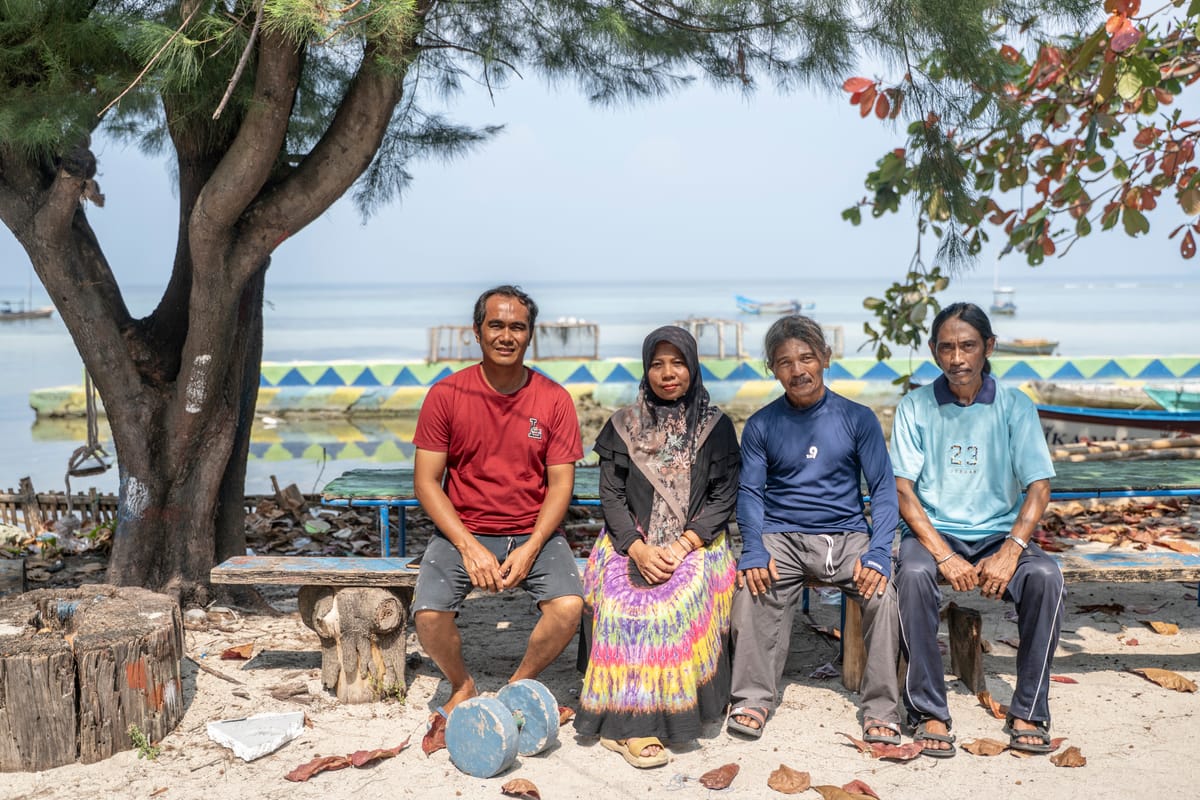
Four residents of Pari Island have sued cement giant Holcim. The court is now deciding if the case can move forward.
Piece co-published with One Earth Now
“I feel the effects of climate change every day. Where shall we go if our island sinks?” Ibu Asmania, a mother of three from a small Indonesian island called Pulau Pari, asked this question in a Swiss courtroom on Wednesday. She was there testifying about her personal experience grappling with the deepening climate crisis, which threatens the very existence of her island home.
The island of Pari, located off the northern shore of Jakarta, Indonesia in an archipelago known as the Thousand Islands, features beautiful yet fragile ecosystems including beaches, mangrove forests, and coral reefs. Like many similarly situated small islands, it is especially vulnerable to sea level rise and already experiences more frequent and damaging flood events. By 2050, much of the island could be permanently submerged, threatening the homes and livelihoods of the island’s 1,500 inhabitants.
In 2023 Asmania and three other Pari Island residents turned to the courts, filing a civil case in Switzerland against that country’s biggest corporate carbon emitter – the cement company Holcim. The action is part of a wave of litigation that has emerged in recent years aiming to hold governments and polluting companies accountable for their role in exacerbating the climate emergency. But this is only the second case in which individuals from the Global South have targeted a company headquartered on a different continent, in the Global North. A lawsuit brought by a Peruvian farmer and mountain guide against the German energy company RWE went to trial in Germany. That case was dismissed in May this year, but the court found that large polluters could in principle be held legally responsible for their carbon emissions.
Now a Swiss court will be determining whether or not a similar case, the one filed by the four Pari Islanders, can move forward to be examined on the merits. The Cantonal Court of Zug held a hearing on September 3 in the case Asmania v. Holcim on the preliminary matter of admissibility. As Johannes Wendland, a legal advisor at the Swiss organization HEKS – an NGO supporting the plaintiffs – explained, this initial hearing is “really about some fundamental questions of access to climate justice” for people who are most severely affected by the climate crisis.
The four plaintiffs in the case – Asmania, Arif Pujianto, Edi Mulyono and Pak Bobby – all reside on Pari Island and make their living in fishing and local tourism. Climate-induced flooding is already impacting these industries. Asmania and her fellow plaintiffs are deeply concerned about their changing environment and the future habitability of their island.
“The sea level is rising constantly. We are extremely worried about it, as no one knows where we could go, if our island is submerged,” says Pak Bobby, a father of four who was born and raised on Pari Island. “I have spent my entire life on this island. And I would also like my children and grandchildren to be able to live here.”
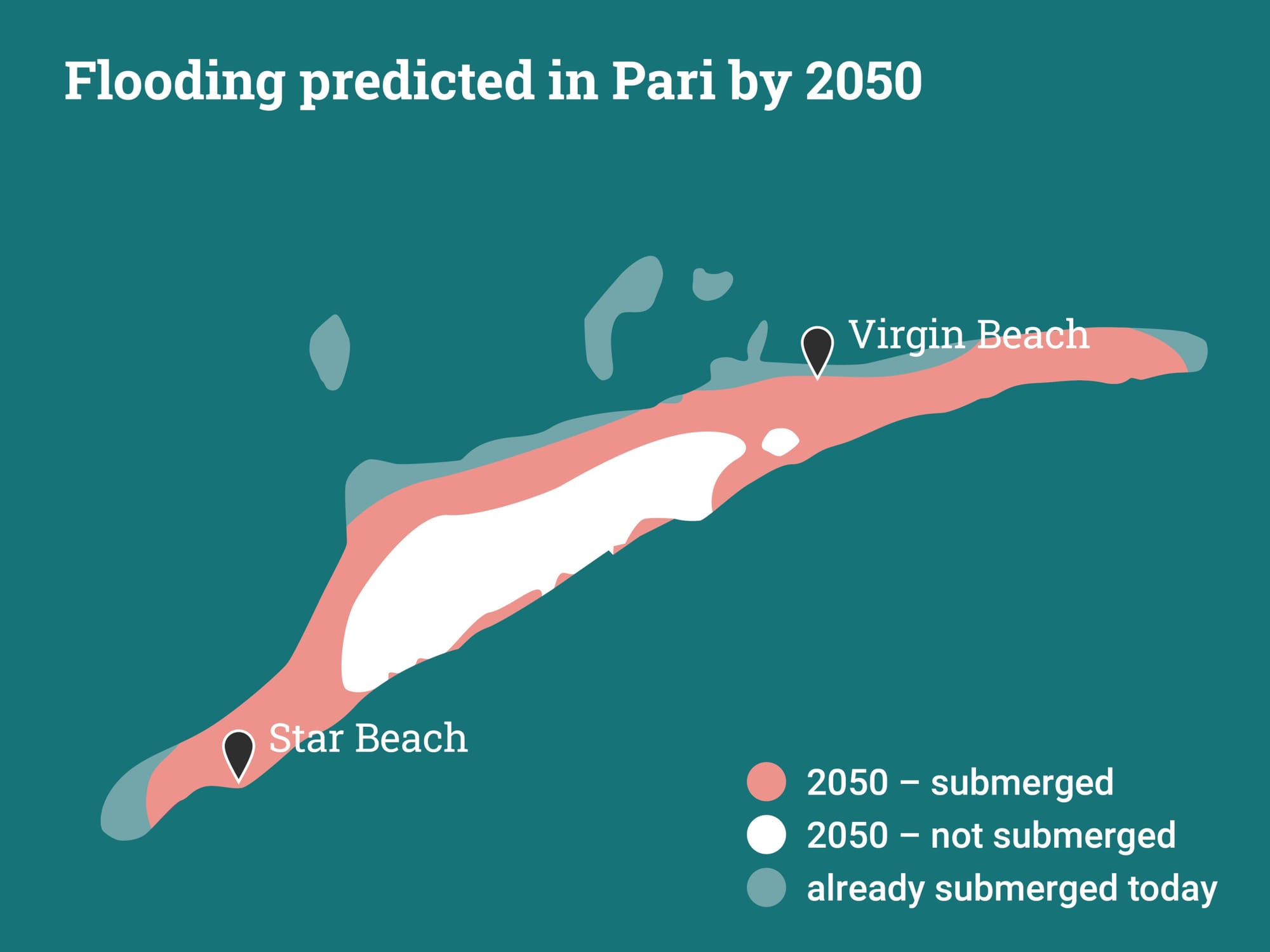
Asmania is the owner of a guest house and small store on Pari Island. She and her husband also own shares in a fish farm off the coast, which brings in a little bit of additional income. She previously worked in the seaweed cultivation business but had to give that up in 2010 as the ecosystem changed. Now, flooding threatens the tourism and fishing business.
“The two floods of late 2021 – as well as earlier high tides – have affected our income,” she says. “They bring oil and grime with them and flood the fish farm. In 2021, I lost 300 of the 500 fish that were being reared at the time. And for two months there were virtually no tourists. We could not let any rooms, sell any food, the shop had no customers, and no one wanted to go snorkeling.”
The organizations supporting the islanders in their landmark legal case include HEKS, an Indonesian-based NGO called WHALI, and the European Center for Constitutional and Human Rights. They argue the plaintiffs deserve justice as they have done very little to cause climate change yet are suffering disproportionately.
“[The plaintiffs] decided to take this step because their home island is a very low-lying island, and it is at risk of being submerged by the sea level rise caused by climate change. This puts at risk [their] homes and livelihoods, but also their human rights, despite the fact that they themselves had not contributed a lot to climate change,” Wendland said.
The defendant Holcim is one of the largest cement producers in the world. Cement production is particularly carbon-intensive; the cement industry as a whole is responsible for roughly 8 percent of global greenhouse emissions. Holcim is considered to be one of the world’s ‘carbon majors’ – the 100-plus global fossil fuel and cement companies that are collectively responsible for generating the majority of industrial carbon emissions that are causing climate change.
Plaintiffs point to Holcim’s significant historical contribution to these heat-trapping emissions in arguing the company should bear some responsibility for the resulting damages. They say that Holcim has emitted over 7 billion tons of CO2 between 1950 and 2021, which equates to about 0.42 percent of all global industrial CO2 emissions since 1750, and more than twice as much as the emissions of all of Switzerland. According to the Carbon Majors database, Holcim has emitted over 3 billion tons of CO2 from 1990 to 2023.
The company rejects the notion that it should be held liable. It says that it is reducing its emissions and is “fully committed to reaching net zero by 2050.”
“We follow a rigorous, science-based approach to [be] net zero aligned with a 1.5°C pathway,” Holcim said in an emailed statement.
Lawyers for the plaintiffs, however, contend that Holcim’s business strategy is not aligned with pathways for limiting warming to 1.5°C, a target that the world is on track to exceed in the coming years. They are demanding that the company take immediate action to sharply curtail its emissions – by at least 43 percent by 2030 and 69 percent by 2040. They also are seeking compensation for damages and request that the company help pay for a portion of the adaptation costs on Pari Island.
The case alleges violations of the islanders’ personal or human rights under Swiss law. Climate justice advocates say the lawsuit is a first-of-its-kind in Switzerland and has potential to set a historic precedent internationally.
“Lawsuits like the one of the Pari Islanders’ really force a conversation about the legal responsibility of large polluters for their excessive emissions,” Theresa Mockel, a legal advisor in the Business and Human Rights program at the European Center for Constitutional and Human Rights, said during a panel session last year in Bonn, Germany. She noted that the Swiss court has already granted legal aid status to the plaintiffs. “The court thereby showed that it is taking the demands of the plaintiffs seriously,” she said. “And that, despite such a case being really unprecedented in Switzerland and also elsewhere, it considers this lawsuit not without any chances of success.”
Key Hearing
During the hearing on Wednesday, lawyers for Holcim argued that the case should be tossed out. If the plaintiffs’ novel legal theory is upheld, they asserted, it would imply that basically anybody could sue anybody else in another jurisdiction over climate change, thus opening the floodgates to virtually limitless legal challenges. They also argued that climate change is not a matter that courts can address and that the plaintiffs in this case are not uniquely harmed since climate change impacts everyone to some extent.
Sebastien Duyck, senior attorney at the Center for International Environmental Law, attended the hearing in Zug, Switzerland and reported on the proceedings through a series of social media posts. At one point during the defense arguments, he noted, Holcim’s lawyer turned directly to the two plaintiffs sitting in the courtroom and “offered them 4 francs, as if to demonstrate that the limited financial claims underpinning the case are irrelevant.” Remarking on that exchange, Duyck said he has “sat in courthouses in several countries but have never experienced such utter disdain for a victim.”
“This hearing made one thing clear: major polluters can only continue their reckless operations by seeking a license to operate outside of the law - demanding to be dispensed from norms that apply to every other person,” Duyck said in another post.
The court said it will announce the timing of its decision on whether the case will move forward in the coming weeks, Duyck reported.
Following the hearing, Asmania and fellow plaintiff Arif Pujianto said they are hopeful that the court will allow their quest for justice to continue.
“We had the feeling that our situation and our arguments were taken seriously,” said Arif.
“We are optimistic,” Asmania added. “After all, our existence is at stake.”
